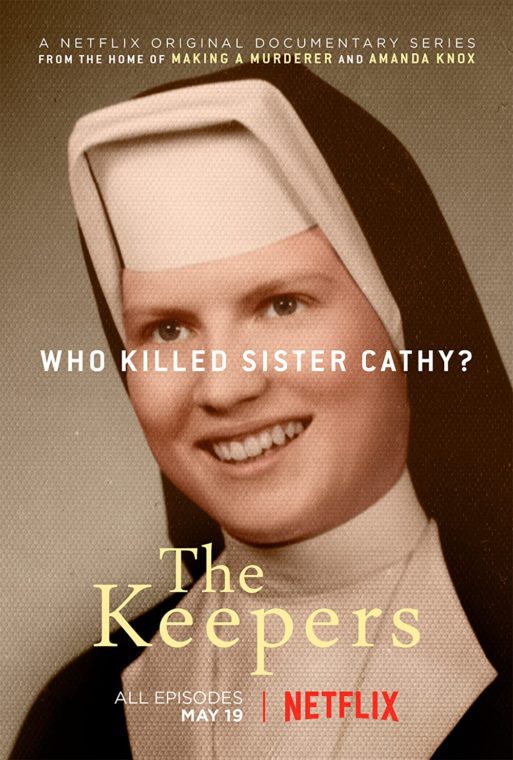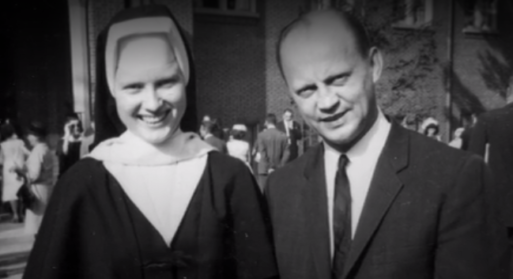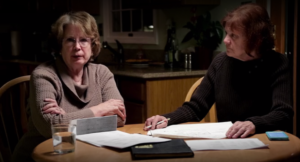 Following its massive success with the series “Making a Murderer,” Netflix has become the place for true crime enthusiasts to gather around and discuss complex murder mysteries. This year, Netflix released another fascinating series about murder and conspiratorial cover-ups, “The Keepers.” In it, we follow the life and untimely death of a devout nun, Sister Cathy Cesnik, whose 1969 murder still hasn’t been solved.
Following its massive success with the series “Making a Murderer,” Netflix has become the place for true crime enthusiasts to gather around and discuss complex murder mysteries. This year, Netflix released another fascinating series about murder and conspiratorial cover-ups, “The Keepers.” In it, we follow the life and untimely death of a devout nun, Sister Cathy Cesnik, whose 1969 murder still hasn’t been solved.
It’s a riveting series filled with unexpected twists and deep dives into countless rabbit holes that will leave you wholly unsatisfied — in a good way. Just when you think investigators find the vital thread that will unravel the entire, twisted ball of yarn, new facts reveal that the thread is a dead end. If you like your documentaries to have a satisfying finale (like HBO’s “The Jinx”), prepare to be disappointed with “The Keepers.”
That doesn’t mean the documentary series isn’t worth watching. In fact, it will only make you more dedicated to solving Sister Cathy’s case. Ryan White’s goal isn’t to create tantalizing television without substance. You get the impression that he truly wants to get to the bottom of Sister Cathy’s murder and bring long-awaited justice to her family and friends. This kind of justice takes time. You can’t wrap it up in just seven hour-long episodes.
In this sense, “The Keepers” differs from most other recent true crime series. In the filmmakers’ intense desire to solve the mystery, it’s easy to forget the victims and survivors of the original crime. This attitude makes some documentaries feel more like works of fiction than the stories of real people. “The Keepers” always puts Sister Cathy’s family and friends first, even as it explores the details of her murder.

Sister Cathy and an unnamed Church official
Credit: Netflix.com
Filmmaker Ryan White does an incredible job balancing cold facts with humanizing empathy. We get the sense that Sister Cathy wasn’t just another murder victim with whom true crime enthusiasts can play detective. She was an intelligent, complex woman who wrote stunning poetry and had a complicated relationship with her faith. We see her struggle in her desire to help people through her work with the Catholic Church, and her disillusionment with unscrupulous church officials. And we see the conflict between her youthful vigor and the mature, stately confines of the convent.
More Than One Victim
We also see that Sister Cathy wasn’t the only victim in “The Keepers.” Without revealing too much of the plot, I’ll share that Sister Cathy was on the cusp of uncovering a sinister side of the Catholic church, which could have led to her murder. In fact, she had discovered that dozens of other women were victims to varying degrees. Although these woman weren’t murdered, they claim to have suffered greatly at the hands of one man, Joseph Maskell, who became a key suspect in Sister Cathy’s murder.

Two of the lead amateur investigators on Netflix’s “The Keepers”
Credit: Netflix.com
Women also play an essential role in “The Keepers.” Two of the key amateur investigators on the case are women. And we hear dozens of stories from other women who knew Sister Cathy or were brave enough to come forward with their own stories of abuse at the hands of Catholic officials. We rarely get to hear these perspectives in true crime documentaries. Yet, they give “The Keepers” a more candid feel. We get the sense that, despite stonewalling by officials, these women are working hard to support one another. It has a message of empowerment at its core.
“The Keepers” is a brilliant case study that other filmmakers should use as an example of what to do with true crime documentaries. The mystery and facts of the case are vital. But it’s just as important to humanize the subjects of these films. “The Keepers” doesn’t come across as some fun murder mystery game. It’s the story of a real, traumatizing event that ripped apart an entire community, and is now bringing it back together. Even if Sister Cathy’s family and friends never find her murderer, they have found some peace and empowerment in each other.

 “The Keepers” Directed by Ryan White
“The Keepers” Directed by Ryan White


 “Help Me, Helen”
“Help Me, Helen”
 Recovering Cremation Remains After the Los Angeles Fires
Recovering Cremation Remains After the Los Angeles Fires
 “As Tears Go By” by Marianne Faithfull
“As Tears Go By” by Marianne Faithfull














